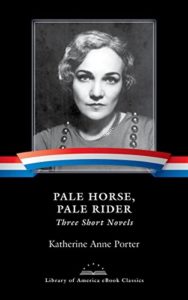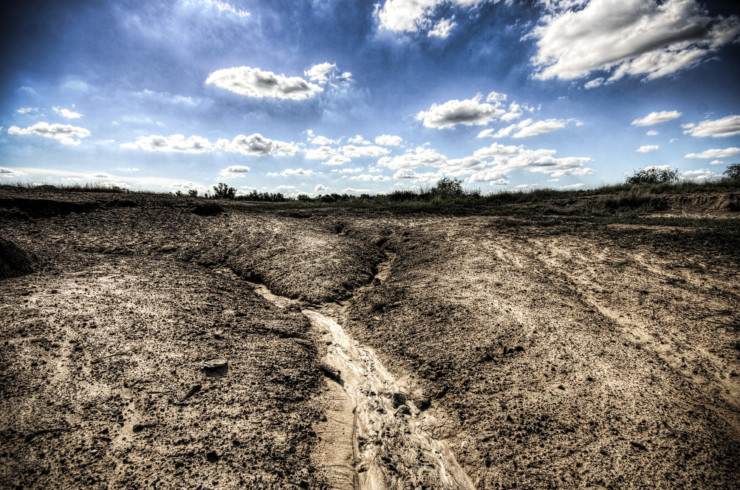On New Year’s night, 2020, I was at a friend’s house to watch a football game. She had an extensive library — a whole wall of shelves — and let me borrow Katherine Anne Porter’s short story collection Pale Horse, Pale Rider, published in 1939. I’m a Texan who had never read anything by this Texas author, and I wanted to start the new year by closing that gap. I did not know that the title story was about the 1918 flu epidemic. I also did not know that a virus would wreak havoc only weeks later.
Across the country restrictions are lifting. I’ve gone from just wanting everything to go back to the way it was to accepting that the path does not lead back — only forward, as it does in Porter’s story.

the simple and lovely miracle of being two persons named Adam and Miranda, twenty-four years old each, alive and on earth, at the same moment.”
What’s on everyone’s mind is the war: “the war, the war, the WAR to end War.” I’d never before thought of the juxtaposition between unrest and pandemic, but it’s been true during other massive outbreaks. It’s true now.
What Miranda is consciously not thinking about is her “burning slow headache.” When she and Adam go out on a date, they specifically do not think about the passing funerals (funerals, plural). But who wants to think about a plague, “something out of the Middle Ages” as Miranda says.
What Miranda wants to think about is whether she does or does not love Adam. Or if she even should try. But it doesn’t matter. She is already sick.
Some of the story’s most beautiful passages occur when Miranda is most ill. Reality and memory and nightmare collide: mountains, buzzards, a jungle, a gangplank, a “fiery motionless particle.” Adam tries to get her medical help, but none is to be found.
They can’t get an ambulance,” said Adam, “and there aren’t any beds. And we can’t find a doctor or a nurse. They’re all busy. That’s all there is to it.”
This is a story about taking stock of your life, the way “a plague, a plague, my God” makes you rethink everything. When Adam asks Miranda if she’s ever been happy, she replies,
I don’t know,” she said. “I just lived and never thought about it.”
How many of us could say the same thing before a virus quarantined us in our tracks?
During this unusual season I have continued to cultivate the practices that have served me well in other unusual seasons — especially walking my dogs in the morning dark and poetry time in the afternoon with a large cup of tea.
Recently The Slowdown podcast featured a poem titled And We Love Life by Mahmoud Darwish, whose work has been part of a Tweetspeak dare. The poem begins “And we love life, if we find a way to it.” The line is repeated three more times, and the last line of the poem is an affirmative “We love life, if we find a way to it.”
Is that what we’re doing with this unplanned-for time? Are we finding a way to love life?
After Miranda recovers she awakens to the sounds of parades for the Armistice. She is not able to enter into the joy of the celebration because her brush with the Pale Horse, Pale Rider of death has made everything around her strange — her own hands, her own face, morning, sunshine. All is new in her brand new Now.
No more war, no more plague, only the dazed silence that follows the ceasing of the heavy guns; noiseless houses with the shades drawn, empty streets, the dead cold light of tomorrow. Now there would be time for everything.”
We have left our shade-drawn houses to find not parades, but protests. The world is changed. Suddenly there is all this time. Do we know what to do with it?
It’s time to love life, friends, to find a way to it.
Photo by Adam Selwood, Creative Commons, via Flickr. Post by Megan Willome.
Browse more Pandemic Journal
“Megan Willome’s The Joy of Poetry is not a long book, but it took me longer to read than I expected, because I kept stopping to savor poems and passages, to make note of books mentioned, and to compare Willome’s journey into poetry to my own. The book is many things. An unpretentious, funny, and poignant memoir. A defense of poetry, a response to literature that has touched her life, and a manual on how to write poetry. It’s also the story of a daughter who loses her mother to cancer. The author links these things into a narrative much like that of a novel. I loved this book. As soon as I finished, I began reading it again.”
—David Lee Garrison, author of Playing Bach in the D. C. Metro
- Perspective: The Two, The Only: Calvin and Hobbes - December 16, 2022
- Children’s Book Club: A Very Haunted Christmas - December 9, 2022
- By Heart: ‘The night is darkening round me’ by Emily Brontë - December 2, 2022


Laura Lynn Brown says
What a felicitous choice from that bookshelf!
Off the top of my fingertips …
This reminds me a bit of what Emily says at the end of “Our Town”: “Oh, earth, you are too wonderful for anybody to realize you. Do any human beings ever realize life while they live it—every, every minute?”
Emily, though, has run out of time. For Miranda, who had the plague and did not die, suddenly there is all this time. And for us, alive in this moment. (Summer often feels expansive that way anyway, doesn’t it?)
And yet — well, even with lifting of restrictions, our plague is still here; in many places, including your state, infections and hospitalizations are rising again. So many folks may be lifting the blinds but not venturing beyond the patio unless they must.
The thing is, as Emily suggests, this is true all the time, but we don’t notice. I think some finding of life has happened during quarantine — all those people learning how to bake sourdough; all those quilters or lapsed seamstresses turning their scraps to masks. It was a different kind of “all this time.” Yet many people still had the experience that everything took longer.
Why does it often take a close call of some sort to recalibrate like this? In emergence from illness, it’s partly simple relief and gratitude at being able to do something again — to smell, to eat an orange, to sit up, to be in fresh air.
I’m rambling here, but I’ll try to finish with a note about the Darwish poem. I take it to mean that finding a way to life, period, is the way to loving life. To realize life as we live it. This sunrise — a new day! I’m alive again! This cup of white tea. This corn muffin topped with guacamole. This walk. Knowing all we ever have is this day.
As Pittsburgh icon Mister Rogers said, let’s make the most of this beautiful day. I suspect part of the answer also has to do with making — loaves of sourdough, masks in interesting fabrics, poems, essays, blessings.
Megan Willome says
Yes, yes, yes, Laura: “Knowing all we ever have is this day.”
I wish it didn’t take illness or threat thereof to be the source of finding our way to life but it is so often the way.
Since this pandemic I’m taking the time to get to know the names of people I see often but don’t know well. They are part of my life, and they deserve to be known by name.
Laura Lynn Brown says
I love that. A naming of lesser importance: I’ve been trying to learn which bird is making each birdcall I can hear in the morning.
Megan Willome says
Another excellent embracing of the time we have.